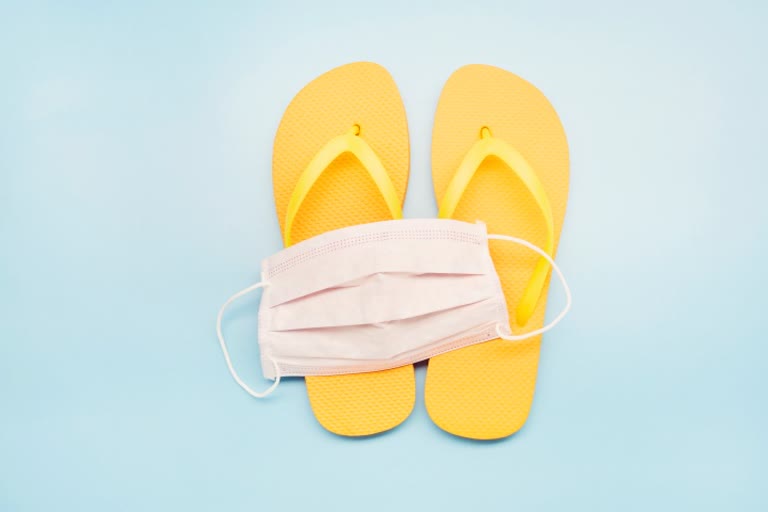Most parts of India, after the second wave of COVID-19, are gradually unlocking. The Indian as well as the state governments are continuously issuing guidelines to ensure that the cases of infection remain in control. So, if you are travelling any time soon, interstates or international, here is what you must know beforehand.
The authorities have slowly started unlocking India after the second wave of COVID-19, which created chaos in the country. And, after this, the government is making every possible effort to keep COVID-19 infection under control. Now that the peak of the second wave is foregone and as travel restrictions are easing, people have started travelling to different cities, states or countries. Therefore, in the same regard, the Indian government along with travel guidelines has also issued new guidelines regarding vaccination for people who are travelling across the country and abroad.
New Guidelines for Foreign Travel
According to the new guidelines, if someone is travelling to a foreign country, the second dose of Covishield can be taken after 28 days of the first dose. But, for others, the gap between two doses of Covishield still remains to be 12-16 weeks.
It has also been made clear that only those people who have gotten the Covishield jab will be given vaccination certificates for foreign travel. Passport number too will be printed on the certificate. Since some countries have not yet given acceptance to Covaxin, people who have had a Covaxin shot will not be provided with the vaccination certificate for travelling abroad.
These guidelines have been issued for people above the age of 18 years, who are planning an overseas trip by August 31. In this, people and students going abroad for jobs and studies, athletes participating in the Tokyo Olympics and their staff have been included. These arrangements are specifically for these people.
Rules For Interstate Travel
Now that the cases of the double mutant COVID-19 in India have lowered, restrictions on the bus, train and other transport services have comparatively eased to allow interstate travel. However, those who are travelling are advised to follow all the rules and COVID-19 protocols as laid by the Government of India and State Governments. It has been clearly stated in the government guidelines that there should be no carelessness in following the safety measures and all the passengers, staff and operators have to strictly adhere to it.
During the trip, special attention is to be paid towards the safety of children, pregnant women and the elderly. Also, during the journey, the driver, staff and passengers are to wear a mask properly and use sanitisers.
Precautions To Be Taken During The Journey
The ETV Bharat Sukhibhava spoke to Dr Sanjay K. Jain, MBBS, MD (Medicine), associated with Apple Hospital, Indore, to know what precautions can be taken at the individual’s end while travelling within the country or abroad. “As far as possible, one must avoid travelling at this time. However, if it is very important, there are certain precautions that can be followed.”:
- Get Vaccinated
Dr. Sanjay says that vaccination before any long or short journey is important. Since vaccines are the only way to prevent the infection and its spread, it is very important that people get themselves vaccinated. Not only for interstate or international travels, but people using public transports to go to work or for any other reason should also get both the doses. - Masking Is Important
Dr. Sanjay recommends using an N95 mask while travelling. It is more effective than a cloth mask or any other. If children are also travelling with you, ensure that they sanitize their hands from time to time and wear their mask or face shield properly. Do not treat kids with outside food. Also, after reaching home, wash your hands properly and take a bath. - Sanitizing Your Hands Often
Whether travelling through aeroplane, trains, bus, cab or any other transport, sanitize your hands immediately when you get in and are seated and when you get out of the transport. Do not touch your eyes, nose and mouth with unsanitized hands. Travel with kids only if it is extremely important. Anything that you bring back home, like shopping bags, wallet, handbag, etc., sanitize them properly with an alcohol-based sanitiser or disinfectant spray. - Follow Physical Distancing And Avoid Outside Food
Do not ignore the rule of physical distancing. Instead of buying something outside, carry your own home-cooked food and a water bottle. In addition to this, do not touch unnecessary objects like poles, windows, etc. in the transport during your journey and even if you do, sanitize your hands immediately.
Apart from this, it is important that the passengers cooperate with the staff and drivers to avoid contracting as well as spreading the COVID-19 infection. Do not consume paan, betel nut, chewing tobacco that you may need to spit. Also, do not smoke cigarettes during your journey. Avoid unnecessary use of mobile. Strictly follow all the rules and regulations to assure your safety as well as that of others travelling along with you.
Also Read: Self-medication During COVID Is Alarming.



